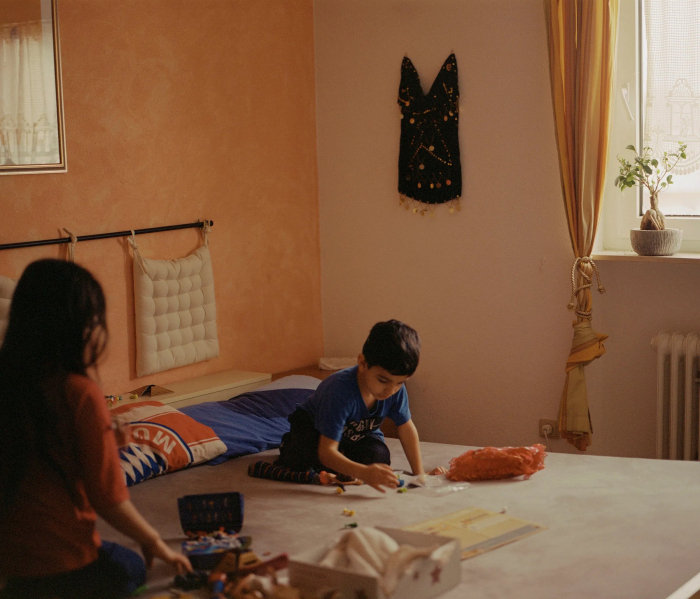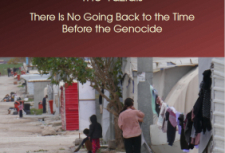Germany no longer happy with migrants, how this will affect Yazidis

Germany's new policy of mass deportation of migrants who have no right to remain in the country is likely to have a significant impact on the Yazidi community, who are one of the few groups of people without their own state and land.
According to preliminary estimates, there are between 100,000 and 150,000 Yazidi refugees living in Germany.
The Yazidi community has already experienced many hardships in recent years. In 2014, the Yazidis were subjected to genocide by ISIS, killing thousands of people. Many Yazidis were also forced to flee their homes and become refugees.
The new migration policy may make it even more difficult for Yazidis to overcome these problems. If Yazidis are denied asylum or deported, they may be forced to return to countries where they face persecution and violence. This can have devastating effects on their lives and can lead to further trauma and displacement.
Following his coalition's two defeats in local elections, Olaf Scholz has taken a tougher stance on migration, proposing mass deportations of those denied asylum.
Amid the general panic that gripped European countries during the 2015-2016 migration crisis, Germany under Angela Merkel's leadership opened its doors to a huge number of migrants.
As part of its "culture of hospitality" (Willkommenskultur) policy, Germany has welcomed more than 1.2 million refugees and asylum seekers.
Now, with illegal migration levels in Europe on the rise again, Germany is reviewing the migrant reception and integration measures it once prided itself on.
"We are limiting illegal migration to Germany. There are too many people coming to us," Chancellor Olaf Scholz said in a recent interview with Der Spiegel. "Deportations should take place more often and faster," he added.
Olaf Scholz said that the FRG should start "massively" deporting migrants who do not have the right to stay in the country.
Scholz said Germany needs to start "massively" deporting migrants who have no reason to stay in the country. Just days later, the federal government approved a bill to speed up the deportation process for illegal migrants who had previously been denied asylum.
This is a huge change for Germany and Social Democrat Scholz, who was expected to continue Angela Merkel's policies in this area.
"There is a marked change in rhetoric and policy with the clear aim of reducing migration. Among the proposed steps are easier deportations, tougher sanctions for traffickers, reinstatement of temporary border controls, further bilateral agreements with the countries where most migrants come from, and expansion of the list of countries deemed safe. "Overall, this is a dramatic policy change, it is the end of Germany's unique 'culture of hospitality' seen in 2015," Michael Bröning, a political scientist and member of the SPD's Basic Values Commission, told Euronews".
Applications will be processed faster
Scholz said he will issue the card instead of cash to refugees who are not in a special situation and whose asylum requests have not been accepted for 3 years so they can have their needs met.
According to preliminary data, Germany has accepted
From 1960 to 2023.
Arabs 4,500,000 - 6,000,000 people
Turks 2,812,000 - 5,000,000 people
Ukrainians 70,000 - 3,260,000
Yazidis 100,000 - 150,000
This is by no means a complete list of refugees and immigrants.
Most of the listed refugees have their own countries, the only ones who do not have their own country are Yazidis, they live all over the world in communities.
Germany has started extraditing Yazidi refugees, which is a nonsense violation of human rights.
The German government should review its new migration policy and take into account the special needs of the Yazidi community. The government should work to ensure that Yazidis can receive asylum and other forms of protection and that they can live safely and freely in Germany.
Tags: #yazidisinfo #newsyazidis #aboutyazidis #germanyyazidis
Germany no longer happy with migrants, how this will affect Yazidis

Germany's new policy of mass deportation of migrants who have no right to remain in the country is likely to have a significant impact on the Yazidi community, who are one of the few groups of people without their own state and land.
According to preliminary estimates, there are between 100,000 and 150,000 Yazidi refugees living in Germany.
The Yazidi community has already experienced many hardships in recent years. In 2014, the Yazidis were subjected to genocide by ISIS, killing thousands of people. Many Yazidis were also forced to flee their homes and become refugees.
The new migration policy may make it even more difficult for Yazidis to overcome these problems. If Yazidis are denied asylum or deported, they may be forced to return to countries where they face persecution and violence. This can have devastating effects on their lives and can lead to further trauma and displacement.
Following his coalition's two defeats in local elections, Olaf Scholz has taken a tougher stance on migration, proposing mass deportations of those denied asylum.
Amid the general panic that gripped European countries during the 2015-2016 migration crisis, Germany under Angela Merkel's leadership opened its doors to a huge number of migrants.
As part of its "culture of hospitality" (Willkommenskultur) policy, Germany has welcomed more than 1.2 million refugees and asylum seekers.
Now, with illegal migration levels in Europe on the rise again, Germany is reviewing the migrant reception and integration measures it once prided itself on.
"We are limiting illegal migration to Germany. There are too many people coming to us," Chancellor Olaf Scholz said in a recent interview with Der Spiegel. "Deportations should take place more often and faster," he added.
Olaf Scholz said that the FRG should start "massively" deporting migrants who do not have the right to stay in the country.
Scholz said Germany needs to start "massively" deporting migrants who have no reason to stay in the country. Just days later, the federal government approved a bill to speed up the deportation process for illegal migrants who had previously been denied asylum.
This is a huge change for Germany and Social Democrat Scholz, who was expected to continue Angela Merkel's policies in this area.
"There is a marked change in rhetoric and policy with the clear aim of reducing migration. Among the proposed steps are easier deportations, tougher sanctions for traffickers, reinstatement of temporary border controls, further bilateral agreements with the countries where most migrants come from, and expansion of the list of countries deemed safe. "Overall, this is a dramatic policy change, it is the end of Germany's unique 'culture of hospitality' seen in 2015," Michael Bröning, a political scientist and member of the SPD's Basic Values Commission, told Euronews".
Applications will be processed faster
Scholz said he will issue the card instead of cash to refugees who are not in a special situation and whose asylum requests have not been accepted for 3 years so they can have their needs met.
According to preliminary data, Germany has accepted
From 1960 to 2023.
Arabs 4,500,000 - 6,000,000 people
Turks 2,812,000 - 5,000,000 people
Ukrainians 70,000 - 3,260,000
Yazidis 100,000 - 150,000
This is by no means a complete list of refugees and immigrants.
Most of the listed refugees have their own countries, the only ones who do not have their own country are Yazidis, they live all over the world in communities.
Germany has started extraditing Yazidi refugees, which is a nonsense violation of human rights.
The German government should review its new migration policy and take into account the special needs of the Yazidi community. The government should work to ensure that Yazidis can receive asylum and other forms of protection and that they can live safely and freely in Germany.
Tags: #yazidisinfo #newsyazidis #aboutyazidis #germanyyazidis

























